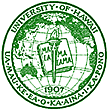
UH cancels all
travel to areas
hit by SARSTrips to Asia are most affected;
the university says it is following
the advice of health experts3 suspected isle SARS cases ruled out The University of Hawaii is canceling all travel by UH-sponsored student and faculty programs to areas of Southeast Asia affected by severe acute respiratory syndrome.
A memo was sent yesterday to chancellors at all campuses saying UH is following travel guidelines from the U.S. Centers for Disease Control and Prevention, World Health Organization and U.S. State Department, said Jenny Samann, director of the Office of International Education.
They advise postponing nonessential travel to China, Hong Kong, Vietnam, Singapore and Toronto.
Anyone at the university who wants to travel on their own must file an "assumption of risk and release form" with the university before leaving, Samann said. "If they're going to sign up for any kind of credit, we really need to know where they are, if they are faculty, student or scholar, so we can keep in touch with them as the situation changes."
The U.S. Department of Education also has said federal money students were to receive for area and language studies cannot be used to go to the areas on CDC's travel advisory this summer, she said.
She said the UH also must "be vigilant" about scholars, exchange and degree-seeking students coming to its campuses.
For example, students are expected from partner universities in Singapore and Hong Kong in the fall, she said.
SARS information is being widely disseminated so everyone will be aware of the symptoms, she said.
"We will closely monitor the situation. We want to provide every education opportunity while keeping people safe."
Two significant programs in the School of Hawaiian, Asian and Pacific Studies are affected by the UH travel ban, said Associate Dean Edgar Porter.
One is a summer language and area studies program, funded through the U.S. Department of Education, that was to travel this summer to China, Japan and Korea.
Porter said his school is looking for alternative means for students to study Chinese.
UH has been getting requests from programs that are evacuating students from China to see if they can finish their studies using the school's online Chinese language program, he said.
Also being canceled is a program funded under a Freeman Foundation grant to have faculty from mainland minority-serving institutions come here for prepping, then go to China this summer to study minority issues, Porter said.
He said the institutions were notified Wednesday that the trip has been canceled, and UH hopes to offer it next summer.
"We've had lots of meetings and lots of debate," he said. "Overall, people are very understanding. Some people thought it was a little overblown. Even those people in the last days, as related to China, say it may not be overblown."
One of the school's programs with minority-serving institutions was to be at Beijing University, "one of the (SARS) epicenters now," Porter said.
A Vietnam program was canceled, and students who normally go to Hong Kong under an agreement with the Chinese University will not be able to go, he said.
Porter said the situation "is very disruptive," but he told the faculty that as long as government and health agencies have advised Americans not to travel to certain areas, "we have no expertise to override their expertise."
The East-West Center is still welcoming visitors "from anywhere in Asia," said Nancy Lewis, with the research program.
But the center is following recommendations of the State Department and CDC to postpone nonessential travel for employees, she said.
A fellow or staff member who wants to go to any of the places cited needs special administrative clearance, she said.
A trip planned to Hong Kong by journalists from the mainland and other countries has been canceled.
And instead of going to Beijing as scheduled next month, Jefferson Fellowship participants will be heading for Seoul, she said.
State Health Department
Centers for Disease Control
Hong Kong Department of Health
